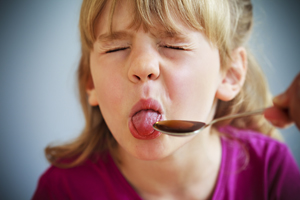Better Tasting Medicines Improve Treatment Outcomes

It is a universal truth: Children don’t like to take medicine.
Many children have trouble swallowing pills and most medications—whether a pill, tablet, or liquid—taste bitter or leave an awful aftertaste. Adults may be able to force themselves past the unpleasantry of medicine, but getting children to take it can be a struggle.
“If the medicines have a bad taste, the kids are not going to take them,” says Max Wiznitzer, MD, a pediatric neurologist and co-chair of CHADD’s professional advisory board. Dr. Wizniter has worked with many young patients and their parents to find a solution to the bitter-pill problem. “Things have to have a reasonable taste so they will be willing to take them. When you try to give kids the regular medications, they won’t take them. They can be bitter and bad-tasting, and the kid won’t take them again. That’s not in the kid’s best interest.”
Medication adherence and ADHD
Willingness and the ability to follow the doctor’s instructions about medication is a real struggle for children, Dr. Wiznitzer says, including many of the medications for ADHD. The American Academy of Pediatrics, the National Institutes of Health, and other medical agencies have invested considerable time and research to improve the willingness of patients to take prescribed medications as directed. Improving both the taste and the form of the medicine is part of the focus, he says, along with reducing the number of times a child must take a medicine in a day.
What the research has concluded is that children are more likely to take medications that taste good instead of ones that taste bitter. Good-tasting medications–or at least ones that aren’t “yucky” to swallow—can increase the likelihood a child will take the medication without a struggle.
Options for taking medication
When children have problems taking medications, Dr. Wiznitzer recommends that their parents talk to the pediatrician about alternatives such as an easier-to-swallow liquid, a medicated patch placed on the child’s skin, or medication with a good flavor that is designed to dissolve in the child’s mouth or in a small amount of water in a glass. Pharmacists can prepare medications with specially made flavors such as bubblegum, watermelon, or grape.
“Pharmacists have a whole battery of things they can add to make it taste better,” he says.
There is a branch of pharmacology that includes “flavorists,” or flavor chemists, who add flavoring to medications to make them more palatable for children.
“The flavorists are like perfumers in that they work with many different agents to achieve different notes and overtones,” says Loyd Allen, PhD, a pharmacist and editor-in-chief of the International Journal of Compounding.
Good-tasting ADHD medications?
An orange-flavored tablet that dissolves on the tongue without water was released in 2016, prompting some critics to express concern that easy-to-take ADHD medication may increase medication abuse. As a pediatric neurologist, Dr. Wiznitzer is dismayed when he hears people argue like this against flavoring medication to improve the likelihood that children will take their medication without a fuss.
“We have [fruit-flavored] products like that on the market; they’re called vitamins,” says Dr. Wiznitzer. “Are you saying you shouldn’t make any medicine taste good? Nobody says we should make vitamins taste bad because kids may abuse them. The idea is you make medication in a formula that kids will take. And then adults have to teach them that it’s medicine and not candy and then safeguard the bottles, like any medication. Just because it affects the brain doesn’t make it any less a medicinal condition than if it affects any other part of the body.”
Dr. Allen says he has heard concerns about improving the taste of medications and tries to reassure parents, while encouraging them to keep all medications out of a child’s reach.
“When it tastes too much like candy, pharmacists are criticized,” Dr. Allen says, “but parents have to assume a certain amount of responsibility for keeping the medications out of the reach of kids.”
Worries about substance abuse
Other critics of improving the taste of medication have stated it could be a gateway toward substance abuse. The opposite appears to be more accurate. Research shows that children with ADHD whose symptoms are treated with stimulants are actually more protected from substance abuse than those who don’t take medication for their symptoms.
“We know the ones who have the greatest risks of drug abuse are the ones who are not treated,” Dr. Wizniter says. “They have the lower risks of drug abuse, and it’s very rare that they will abuse their ADHD medicines.”
Anything that improves the chances that the kids will take their prescribed medications as directed improves the likelihood that the treatment will help. Taking the struggle out of getting them to take their medication can also help improve the parent-child relationship.
Looking for more than a taste of this information?
- Managing Medication for Children with ADHD
- Preventing Medication Abuse and Diversion
- Ask the Expert Webinar: The Choice is in the Details—Medication Options for ADHD
- Low-Tech Medication Diary Can Help Fine-Tune Treatment
- What ADHD Medication Can and Can’t Do
- Is Your Teen Ready to Make Medication Decisions?
Join the discussion: How do you encourage your children to take their medications?
